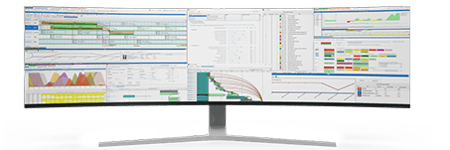Employing Digital Tools to Enhance Product Quality
Medical devices and products must meet stringent regulatory requirements while ensuring patient safety and effectiveness. In this environment, digital transformation has become a cornerstone for achieving operational excellence and enhancing product quality.
Manufacturing IT managers are increasingly looking for advanced digital tools to optimize processes, improve visibility, and ensure that every product leaving the production line meets quality standards. One such tool that is transforming the way medical manufacturers operate is PlanetTogether, a robust Advanced Planning and Scheduling (APS) software. When integrated with enterprise solutions like SAP, Oracle, Microsoft Dynamics, or Kinaxis, it can unlock powerful synergies, driving improvements in product quality and overall operational efficiency.
In this blog, we will explore how digital tools like PlanetTogether, integrated with major ERP systems, can be leveraged to enhance product quality in medical manufacturing. We will also delve into the role of data integration, real-time monitoring, and predictive analytics in creating a quality-first production environment.

The Importance of Quality in Medical Manufacturing
Product quality in the medical manufacturing industry directly impacts patient outcomes and can have legal and financial ramifications for manufacturers. Regulatory bodies such as the FDA in the U.S. and the EMA in Europe impose strict requirements to ensure that medical devices, pharmaceuticals, and other medical products are safe and effective. As a result, any quality issues that arise in the manufacturing process can lead to costly recalls, legal challenges, and damage to a manufacturer’s reputation.
Quality management in medical manufacturing includes various stages, from design and development to production and post-market surveillance. Each stage involves critical checks and balances to ensure compliance with Good Manufacturing Practices (GMP) and ISO standards. This is where digital tools can play a significant role in providing greater control over the process, ensuring that issues are identified early, and corrective actions are implemented immediately.

Digital Transformation in Medical Manufacturing
The shift towards digitalization in medical manufacturing has been accelerating, particularly in the wake of global challenges such as supply chain disruptions and workforce shortages. For IT managers, this transition presents an opportunity to implement systems that improve operational visibility, facilitate data-driven decision-making, and enhance collaboration across departments.
One key area where digital tools make a significant impact is in improving the planning and scheduling process, ensuring that production runs are aligned with quality objectives. Tools like PlanetTogether’s Advanced Planning and Scheduling (APS) system offer real-time insights into production schedules, material availability, and machine performance, which are critical factors in maintaining consistent product quality.
When integrated with major ERP systems like SAP, Oracle, or Microsoft Dynamics, PlanetTogether creates a unified data environment that allows manufacturers to:
Synchronize production schedules with quality control processes.
Improve traceability of materials and components across the supply chain.
Identify bottlenecks and inefficiencies that could impact product quality.
Enable real-time monitoring and predictive maintenance to prevent equipment failure during critical production runs.
![]()

Integration Between PlanetTogether and ERP Systems
Integrating an APS system like PlanetTogether with an ERP platform such as SAP or Oracle enables seamless communication between planning and execution systems. This ensures that quality data is available in real time, providing insights into how different variables—such as material quality, machine performance, or operator efficiency—affect the overall quality of the product.
For example, when integrated with SAP S/4HANA, PlanetTogether can pull real-time data from production orders, inventory levels, and quality control checks to dynamically adjust schedules. If a batch of raw materials fails to meet quality standards, the system can immediately reschedule production or allocate different resources to maintain the production flow without compromising product quality.
Similarly, when paired with Oracle's supply chain solutions, the integration allows for enhanced supply chain visibility, where upstream and downstream quality impacts can be monitored in real-time. This integration ensures that quality metrics are not siloed but are part of a larger ecosystem that includes procurement, production, and distribution.
These integrations reduce manual intervention and human error, two significant sources of quality failures in medical manufacturing.
Real-Time Data and Its Impact on Product Quality
One of the most powerful benefits of employing digital tools in medical manufacturing is the ability to collect and analyze data in real time. Real-time data can be used to monitor every aspect of the production process, from raw material input to final product testing.
For instance, PlanetTogether’s APS system can work with Microsoft Dynamics to provide real-time updates on production performance. This integration allows IT managers and production teams to adjust schedules based on real-time events, such as machine downtime or quality control issues. By having access to real-time data, manufacturing teams can make quicker, more informed decisions that prevent minor issues from escalating into major quality problems.
Additionally, predictive analytics, fueled by real-time data, can help medical manufacturers identify patterns that may indicate future quality issues. For example, if a particular machine shows signs of wear that could lead to production errors, predictive maintenance can be scheduled before the machine causes a quality failure. This proactive approach significantly reduces downtime and ensures that production lines run smoothly, thereby maintaining consistent product quality.
Enhancing Traceability and Compliance
Medical manufacturing is subject to rigorous audits and must maintain detailed records of every stage of the production process. Traceability is critical for ensuring compliance with regulatory standards and for managing potential recalls or quality investigations.
Digital tools like PlanetTogether, when integrated with ERP systems such as Kinaxis or Aveva, enhance traceability by providing a comprehensive view of the supply chain. These integrations allow manufacturers to track each component of a medical device or product from the supplier to the finished product. If a quality issue is identified, manufacturers can quickly trace the source of the problem and take corrective action before products reach the market.
For instance, by integrating PlanetTogether with Kinaxis RapidResponse, manufacturers can not only optimize their production schedules but also ensure that quality data is linked to every part of the supply chain. If a raw material batch is found to be defective, the system can trace where that batch was used in production and isolate the affected products, thereby containing the issue before it becomes a larger problem.
This level of traceability not only helps maintain compliance with regulatory bodies but also builds trust with healthcare providers and patients, who rely on the safety and effectiveness of medical products.
Automating Quality Control
Automation is another key benefit of digital transformation in medical manufacturing. Digital tools can automate quality control processes, reducing the likelihood of human error and ensuring that every product meets the necessary standards. Automated systems can continuously monitor production parameters and compare them to predefined quality criteria, ensuring that deviations are detected and addressed immediately.
PlanetTogether’s APS software, integrated with systems like SAP or Oracle, can automate the scheduling of quality checks at critical points in the production process. This ensures that quality inspections are not skipped or delayed, even in the case of unexpected production changes. Automation also reduces the administrative burden on quality control teams, allowing them to focus on more strategic tasks such as process improvement and root cause analysis.

The Role of IT in Driving Quality Improvements
As a Manufacturing IT Manager in a medical manufacturing facility, you play a crucial role in driving the adoption of digital tools that enhance product quality. Your expertise in integrating systems and ensuring data flow between various platforms is critical to the success of these initiatives.
When considering the implementation of tools like PlanetTogether and their integration with ERP systems, it's important to focus on:
Data integrity: Ensuring that data flowing between systems is accurate, consistent, and timely.
User training: Ensuring that staff members are trained to use the tools effectively and that they understand how digital tools contribute to product quality.
Scalability: Selecting tools that can grow with the organization as production volumes increase or as new product lines are introduced.
Regulatory compliance: Ensuring that all digital tools are compliant with industry regulations, particularly those related to data security and patient privacy (e.g., HIPAA).
By embracing these responsibilities and championing the integration of digital tools, you can drive significant improvements in product quality, operational efficiency, and regulatory compliance within your organization.
Employing digital tools like PlanetTogether, in conjunction with ERP systems such as SAP, Oracle, Microsoft Dynamics, Kinaxis, or Aveva, offers medical manufacturers a powerful solution to enhance product quality. These tools provide real-time insights, improve traceability, and enable predictive maintenance, all of which contribute to a more reliable and efficient production process.
As a Manufacturing IT Manager, your role in facilitating the integration of these systems is critical. By leveraging these technologies, you can ensure that your facility remains competitive in the ever-evolving medical manufacturing landscape, while continuously delivering high-quality products that meet regulatory requirements and exceed patient expectations.
The future of medical manufacturing is digital, and by adopting the right tools and strategies, you can lead your organization toward a new era of quality excellence.
Are you ready to take your manufacturing operations to the next level? Contact us today to learn more about how PlanetTogether can help you achieve your goals and drive success in your industry.
Topics: PlanetTogether Software, Integrating PlanetTogether, Enhancing Traceability and Compliance, Medical Manufacturing, Real-Time Data and Its Impact on Product Quality, Automating Quality Control




















LEAVE A COMMENT